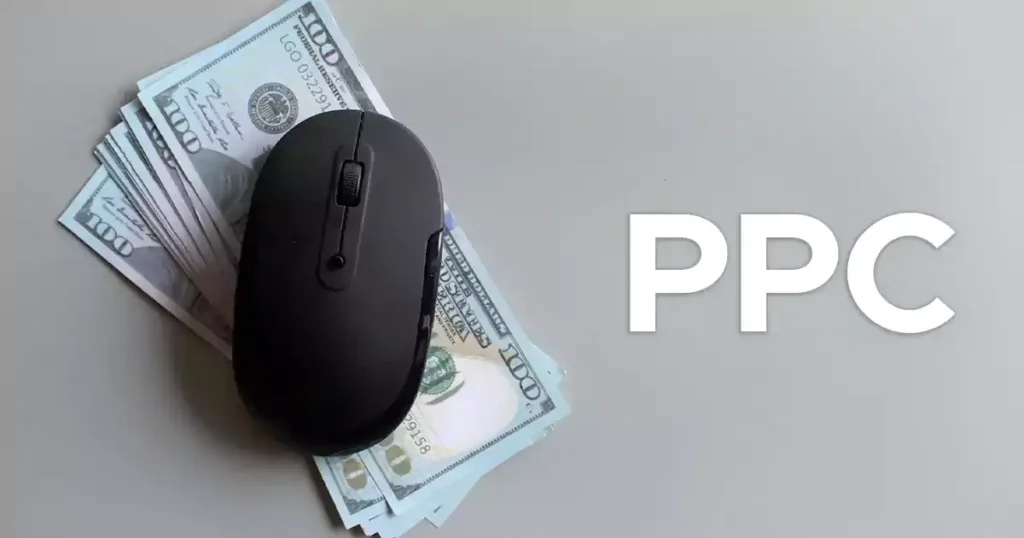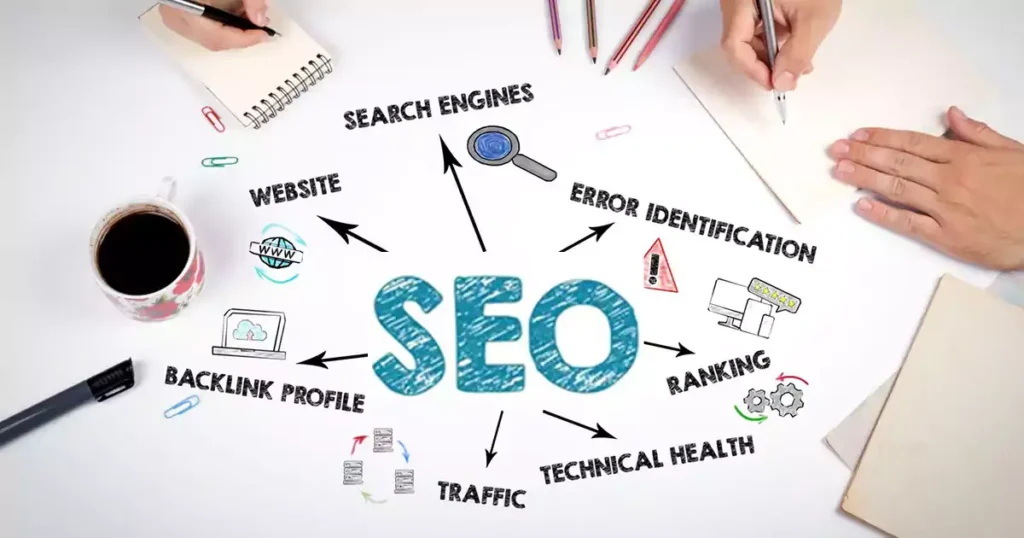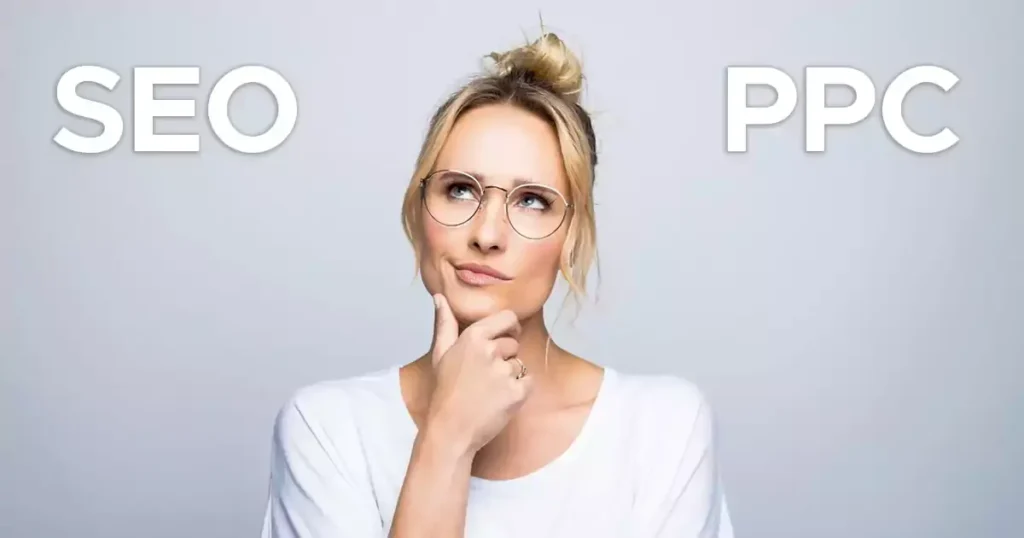The eternal question of “SEO vs. PPC: Which is better?” still exists in today’s competitive online world.
It’s a topic that has generated many discussions among marketers, business owners, and entrepreneurs looking for the best way to increase their online presence and boost conversions.
The SEO vs PPC statistics show that 64% of marketers actively invest in SEO, according to the most recent HubSpot Research survey.
Both search engine optimization (SEO) and pay-per-click (PPC) advertising have benefits, but choosing which is the best requires carefully analyzing each strategy’s advantages and disadvantages.
Choosing between SEO and PPC is crucial in this dynamic environment where success is measured in clicks, conversions, and ROI.
Let’s dive in and learn the strategies behind SEO and PPC so that we can finally take your digital marketing efforts to outstanding success.

What is PPC?
Pay-Per-Click, or PPC, is a popular digital advertising strategy in online marketing. It works on the concept that marketers pay a price each time a user clicks their advertisement.
This model is frequently connected to search engines, with Google Ads as a prominent example. When people search for particular terms related to an advertiser’s products or services, the ad of the highest bidder is prominently shown in the search results.
Furthermore, PPC campaigns offer a great deal of choice to marketers, allowing them to set budgets, target particular demographics, and monitor the effectiveness of their advertising in real-time.
Businesses can use it to enhance brand awareness, attract traffic to their websites, and generate potential leads or sales in an affordable and measurable method.
Pros And Cons of PPC
A popular online advertising strategy that enables companies to display their ads on search engines and other platforms is pay-per-click (PPC) advertising. Even though PPC has many benefits, it also has certain disadvantages.
Here are the pros and cons of PPC advertising:
Pros of PPC:
- Immediate Results: PPC campaigns can start generating traffic and results immediately after being set up. It is beneficial for companies looking for a quick increase in website traffic or sales.
- Control And Flexibility: PPC campaigns are highly customizable for advertisers. They can set budgets, choose keywords, specify geographic targeting, and plan ad displays to meet their objectives and target audience.
- Measurable Results: PPC platforms offer in-depth analytics and performance metrics. Conversions, click-through rates (CTR), return on investment (ROI), and other crucial data can be tracked by advertisers, enabling data-driven decision-making and optimization.
- Keyword Targeting: PPC allows advertisers to focus on particular keywords, ensuring that their ads are seen by individuals actively looking for products or services associated with those keywords. The chances of conversions increase as a result.
- Ad Testing: PPC platforms allow A/B testing of headlines, landing pages, and ad copy. It assists advertisers in modifying their efforts over time for better results.
Cons of PPC:
- High-cost: One of its main disadvantages is PPC marketing can be expensive. Advertisers must pay each time a user clicks on their ad, and the expense can go up rapidly, mainly if the advertiser competes for highly competitive keywords.
- Click Fraud: Click fraud is a persistent problem in PPC marketing. Competitors or evil individuals could click on your ads without the intention of buying, wasting your money. PPC systems use measures to identify fraud. However, they are not foolproof.
- Ongoing Management: Successful PPC campaigns demand constant observation and modification. Effective ad campaign optimization requires a lot of time and expertise.
- Competition: The cost per click (CPC) for popular keywords might be prohibitively expensive in highly competitive industries. Smaller companies with limited budgets can find it difficult to compete successfully.
- Limited Organic Reach: Using only PPC may cause you to neglect organic search engine optimization (SEO). Long-term survival depends on organic traffic, and relying excessively on PPC could hinder efforts to establish a solid organic presence.

What is SEO?
SEO or search engine optimization is the method of optimizing a website or online piece of content for search engine results pages (SERPs)
It includes various tactics and strategies to boost organic or unpaid traffic to a website. These strategies include technical SEO, link building, content creation, and on-page optimization.
While organic SEO increases rankings naturally, paid SEO invests in paid advertising campaigns to improve a website’s visibility on search engines using pay-per-click (PPC) advertising techniques.
Paid SEO can support organic SEO efforts by immediately boosting a website’s visibility and bringing in more qualified visitors.
Pros And Cons of SEO
Websites that use SEO (search engine optimization) are more likely to appear higher in search engine results pages (SERPs). It has many advantages but has its share of challenges and cons.
The following are the advantages and disadvantages of SEO:
Pros of SEO:
- Increased Organic Traffic: SEO can significantly boost your website’s organic (non-paid) traffic. More individuals are likely to click on your website when it appears higher in search results, increasing its visibility and website traffic.
- Cost-Effective: SEO is more affordable over the long run than paid advertising. The ongoing maintenance costs are inexpensive once you optimize your website and content.
- Credibility And Trust: High search engine rankings can improve a website’s credibility and trustworthiness in the eyes of users. People are more likely to trust organic search results than paid ads.
- Targeted Traffic: SEO enables you to target particular demographics and keywords, ensuring that your website gets visitors who are genuinely interested in your products or services.
- Better User Experience: SEO often involves content and structure optimization of websites, which can improve user experience. This could lead to longer visit durations, lower bounce, and higher conversion rates.
- Long-Term Strategy: SEO is a long-term approach that can produce sustainable results over time. When your website starts to rank well, it can keep up with the competition by getting frequent updates and maintenance.
Cons of SEO:
- Time-Consuming: SEO is not a quick fix. Particularly in highly competitive industries, seeing significant effects can take months or even years. It takes patience.
- Algorithm Updates: Search engines regularly make algorithmic changes, which can lead to changes in rankings. It can be difficult to keep up with these changes and modify your plan accordingly.
- Technical Expertise Needed: SEO requires technical knowledge in website optimization, keyword research, and backlink analysis. You need to invest in training or hire professionals to perform these responsibilities successfully.
- Uncertain ROI: As results might change depending on several factors, it can be difficult to determine the exact return on investment (ROI) of SEO efforts.
- Constant Maintenance: SEO is a continuous process. Therefore, updating and improving your website and content takes constant time and resources to keep up good rankings.

SEO Vs PPC: Which One to Choose?
The decision between PPC and SEO (Pay-Per-Click) depends on the resources and objectives you have in mind.
Optimizing your website for SEO is a long-term strategy to help it rank higher in organic search results. It provides constant free traffic but takes time to see significant results.
On the other hand, PPC enables immediate exposure by paying for advertisement placements on websites or in search results. While it might produce fast results, it also demands constant investment.
Therefore, consider your goals, timeline, and budget before deciding. SEO is the best option to optimize your online presence over time and seek long-term, cost-effective results.
PPC can deliver quick results while you work on your SEO plan simultaneously if you need immediate traffic and have a budget.
Additionally, combining the two can frequently produce the best results depending on your business goals and marketing approach.
Discover The Power of SEO & PPC With ByteTeck Consulting!
Are you wondering which approach is best for your company—PPC or SEO?
No worries!
ByteTeck Consulting has the solution you’ve been looking for.
Our dynamic team knows there isn’t a one-size-fits-all solution when deciding between SEO and PPC.
We are here to help you make the best choices and develop a successful plan perfect for your requirements.
Don’t let your online presence fall behind!
Contact us now to arrange a consultation and see how ByteTeck Consulting can improve your website’s visibility, attract more visitors, and boost conversions.
Takeaway
It’s crucial to understand that the answer to the question “SEO vs PPC: Which is better?” isn’t about picking a winner. It’s about utilizing the unique benefits of each method to build a thorough marketing strategy that works for your company.
Moreover, the goal is to align your digital marketing efforts with your specific goals and remain attentive to the ever-evolving demands of your audience, regardless of whether you decide to invest more heavily in one or strike a balance between the two.
The key to success in the modern digital age often depends on balancing these two essential elements.
Your goals and budget will determine this. While SEO (Search Engine Optimization) is a long-term strategy that can be cost-effective but takes time to see results, PPC (Pay-Per-Click) is a quick solution that costs money.
The main difference is that SEO focuses on organic, unpaid search results and involves optimizing your website and content to rank better in search engine results. On the other hand, PPC requires paying for advertisements to be displayed on top search results.
PPC is not a part of SEO. While SEO is an organic, non-paid method of increasing search engine ranks, PPC is a paid advertising technique.
SEO doesn’t require constant ad expenditure so it may be more affordable for small businesses. PPC can provide immediate visibility but comes at a greater starting price.
SEO is preferable to paid advertisements because it can provide steady, long-term traffic without ongoing advertising expenses. Since it depends on organic rankings, it also encourages user trust and reliability.
PPC and SEO each have their own challenges, but some people consider SEO more difficult because of its constantly evolving algorithms, longer response times, and demand for technical expertise.
In comparison, PPC provides more immediate control and predictability over the placement of ads and their results.